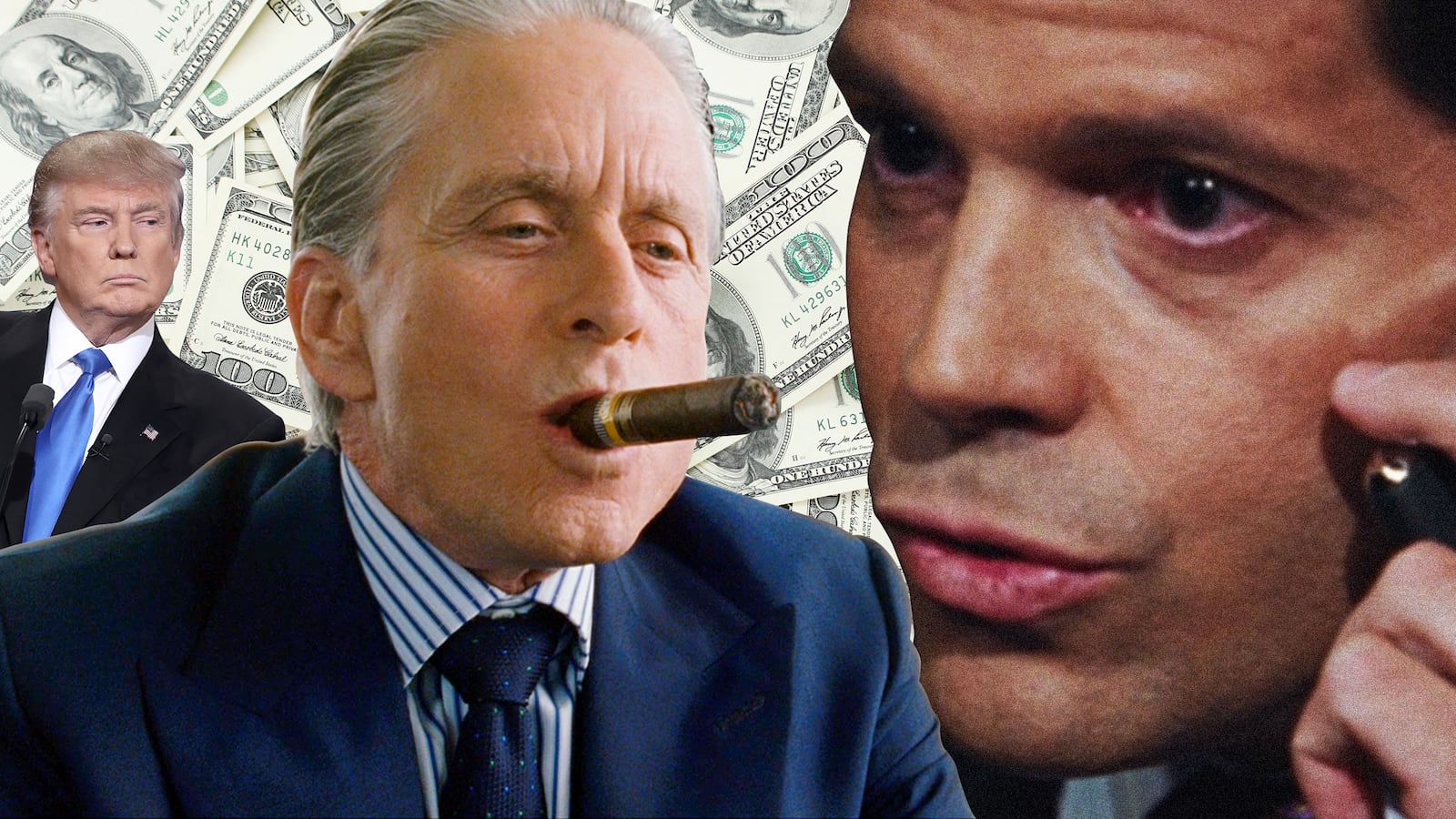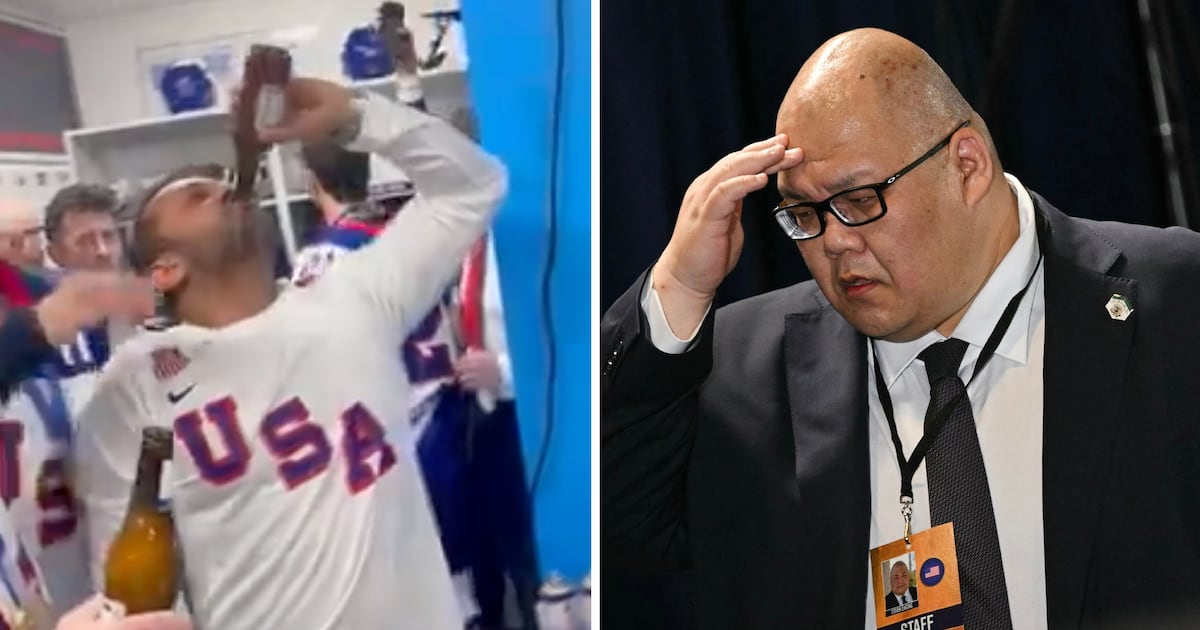Seven years ago, the President of the United States and his communications director lobbied to appear in an anti-capitalist Oliver Stone movie starring Shia LaBeouf.
Only one of them made it into the final cut.
The film, Wall Street: Money Never Sleeps—a sequel to the 1987 original—follows a reformed Gordon Gekko (Michael Douglas) who, after serving eight years in prison for securities fraud, attempts to warn banking bigwigs of the impending financial crisis. When his pleas fall on deaf ears, the douchebag-Cassandra opts to repair his relationship with his estranged daughter (Carey Mulligan) and help her fiancé (LaBeouf) exact revenge on a cutthroat investment banker in the Gekko mold, Bretton James (Josh Brolin).
Unfortunately, in addition to the heaps of obnoxious pre-release press on the project—including LaBeouf’s outlandish claim that he turned $20,000 into $300,000 in two and a half months day trading and was prepping for the Series 7 exam—the film failed to match the original’s enticing mélange of perverse luxury and corporate cynicism, with its plot marred by CNN-mimicking split-screens, distracting celebrity cameos, and an eyeroll-inducing denouement.
One of the more “organic” cameos in Stone’s film comes courtesy of Anthony Scaramucci, whom President Trump recently installed as White House communications director. Back then, before he accused Trump’s senior strategist Steve Bannon of indulging in autofellatio, the tough-talkin’ Long Island native was best known as the founder of SkyBridge Capital, an investment firm managing billions in assets, as well as the “Wall Street guy” who posed a question to President Obama at a CNBC town hall—and was subsequently eviscerated for it by Jon Stewart on The Daily Show (just three days prior to Money Never Sleeps’ theatrical premiere).
Scaramucci, who goes by the nickname “The Mooch,” pops up briefly in two interstitial scenes of Money Never Sleeps as an unnamed short seller working for Churchill Schwartz, the investment firm run by Brolin’s villain.
In both of the scenes, presented in split-screen, Scaramucci is talking to clients by phone, and in the later one, at around the film’s 40-minute mark, he even appears to channel his new boss, using one of Trump’s favorite made-up words.
“Churchill Schwartz has a yuge position in this thing and I want to get you in that stock,” he says.
The Mooch’s brief cameos, which amount to less than fifteen total seconds of screen time, didn’t come cheap. According to sources close to the production, in exchange for the cameos—and the SkyBridge Capital logo being displayed prominently during a charity gala sequence in the film—Scaramucci ponied up around $100,000. Former president George W. Bush didn’t nickname him “Gucci Scaramucci” for nothing.
That, of course, is more screen time than Donald Trump received.
The Donald, then a real estate magnate turned reality television host, was fresh off the third installment of Celebrity Apprentice—a show where C- and D-listers such as Gary Busey and Tom Green (remember him?) competed in tasks like “who can raise the most money auctioning off bling from Ivanka Trump’s upscale jewelry line.” During the previous season of the show, Trump infamously sexually harassed contestant Brande Roderick on national television, musing, “It must be a pretty picture—you dropping to your knees.”
In the deleted scene, Trump (playing himself) runs into Gekko at a barbershop in London (though eagle-eyed viewers will recognize it as Tommy Guns Salon on the Lower East Side of Manhattan). It came toward the end of the film, with Gekko back on top again running a successful hedge fund.
“Hey, is this the one and only Gordon Gekko?” offers a very stiff Trump, to which the conman replies, “Hey, Donald! What are you talking about? You’re the one-and-only!” The two, apparently old friends, make small talk, with Trump repeatedly referring to Gekko as “Gordo.” Near the end of the one-minute scene, Trump even pokes fun at his inventive hairstyle, telling Gekko, “Has anyone ever told you that you’d look great—really great—in a combover?”
It’s a better performance than his pouty, Razzie-winning turn in the dreadful ‘80s rom-com Ghosts Can’t Do It, but not by much. And though it didn’t make the final cut of Wall Street: Money Never Sleeps, the Trump-Gekko scene did wind up in the film’s DVD extras.
According to Stone, Trump was “good” but came with “two pages of prerequisites” for his scene. The list of demands, which were obtained by Newsweek, read as follows:
“The preferred camera angle is Mr. Trump sitting front face to camera slightly favoring his right side, while avoiding left hair part and back and sides of hair and head. Camera eye level or above. If any angle shots need to be taken, please only use Mr. Trump’s 3/4 right side angle shot, while still avoiding the back and sides of hair/head. Lighting, warm golden lighting (no red tones please). Can you please include an eye light (if shooting in high definition, eye light needs to be even more powerful). Also, we had more success with being front lit and avoiding strong lighting behind top of hair/head). The result is golden blond hair, warm golden (even tone) tan skin and a more defined jaw-line. A great reference for Mr. Trump’s look is always the boardroom scenes in Celebrity Apprentice. Can you please provide a monitor for Mr. Trump to see the shot before he starts.”
Furthermore, the New York Daily News reported that those involved with Trump’s barbershop scene had to sign a contract stating that they would not touch his cotton candy hair.
“They made everyone sign this contract that you couldn’t touch his hair,” an insider told the Daily News. “The two hairdressers and the production team had to sign this contract.”
Not everyone was happy about Trump’s diva-like demands. “It was absolutely absurd,” the film’s producer, Eric Kopeloff, told Newsweek. “You can look and see the movies I’ve made. [I’ve worked with] all these movie actors. Never, ever, have I seen anything like this. Not from the biggest movie stars in the world.”
Oliver Stone, the film’s director, was more diplomatic, telling The Hollywood Reporter that Trump was “stunning” as an actor.
“You know, we did take one with Michael and [Trump] talking in a barbershop. And he jumped up after the take and he said, ‘Wasn’t that great?’ You know, he kept doing it. And we kept going because I was deepening the scene as we went. And he didn’t understand nine takes. He’d just done eight, nine takes, he’d never understand it. But every scene, he’d just jump up. He was the same way every time. He didn’t change. But I knew that,” recalled Stone.
The Oscar-winning filmmaker added that he decided to cut out Trump “because it was a writing issue in terms of—it was too late and too little for where we were, at that point in the movie. And I wasn’t thinking about his future presidency or anything like that. I was just dealing with an editing issue.”
Would that it were so simple.






